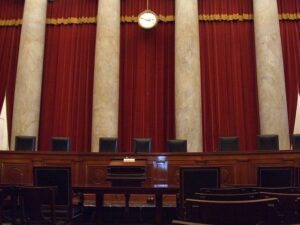
This fall the United States Supreme Court will add its opinion to the online sales tax debate. The court has agreed to hear a case challenging Colorado’s “Amazon Tax.” The 2010 law requires online retailers located outside the state to notify consumers of the state sales tax they would owe on purchases. Not only that, the law required these companies to turn over customer names to the state so that the state could enforce the remittance of self-assessed use tax. The Direction Marketing Association [DMA] challenged the law on the basis it violated a consumer’s right to privacy.
The “Amazon Tax”
One of the more interesting aspects of this legislation concerns how sales tax is collected. The Colorado law doesn’t ask out-of-state companies to collect sales tax, but it does require them to report the names, address and total annual purchases. This is a pretty clever way (read “Big Brother”) of charging an online sales tax – albeit in a roundabout way. A federal district court sided with DMA on the grounds that the notice and reporting aspects of the law violated the Commerce Clause of the Constitution. The 10th Circuit Court of appeals later overturned this decision.
A Possible Fix?
This isn’t the first time an idea like the “Amazon Tax” has faced legal challenges. The issue has sprung up in other states including Michigan, North Carolina and Illinois. Back in 1992 the Supreme Court essentially paved the way for catalog retailers (and now on-line retailers) in the case Quill v. North Dakota. In Quill, the court affirmed that companies don’t have to collect sales tax if they lack a physical presence in a state. Of course, the world was a much different place in 1992! The growth of the internet and the accompanying issues such as online purchases, our shrinking tax base (i.e.; purchasing electronic media vs. a CD) and evolutions of technology not even contemplated in 1992 (such as software as a service, or SaaS) have led to much discussion that the ruling in Quill should be revisited.
Back in 1992, the Supreme Court sent the hornet’s nest back to Congress. The U.S. Constitution, under the Commerce Clause, gives Congress the authority to regulate commerce among the states. Thus, the only way this gets sorted out is with action from Congress. A revised Marketplace Fairness Act of 2013 passed the Senate back in May 2013, and now sits in the House. At this juncture, we don’t know if (or when) the House will act on the Marketplace Fairness Act. But it will be interesting to see how the Supreme Court rules in the Colorado case later this year. You can bet that all of us state tax junkies will be eagerly awaiting the ruling!
Photo Courtesy: John Marino via Flickr













